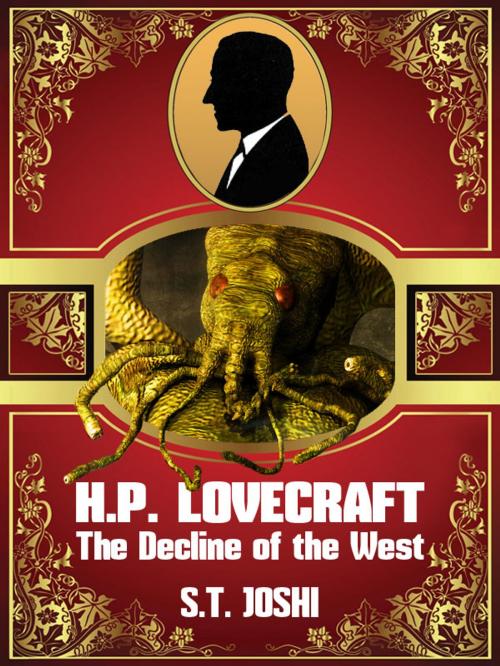H. P. Lovecraft: The Decline of the West
Fiction & Literature, Literary Theory & Criticism, American| Author: | S. T. Joshi | ISBN: | 9781479427543 |
| Publisher: | Wildside Press LLC | Publication: | May 28, 2016 |
| Imprint: | Wildside Press | Language: | English |
| Author: | S. T. Joshi |
| ISBN: | 9781479427543 |
| Publisher: | Wildside Press LLC |
| Publication: | May 28, 2016 |
| Imprint: | Wildside Press |
| Language: | English |
This book began as an expansion of my essay, "H. P. Lovecraft: The Decline of the West," in The Weird Tale, but very quickly became something quite different, to the degree that the two works have little save the title in common. I have always been interested in Lovecraft the philosopher, and in my Starmont Reader’s Guide to Lovecraft (1982) I attempted a very compressed account of his philosophical views. To treat so complex a thinker as Lovecraft in a few pages was obviously untenable, even though I think those few pages at least convey the unity of his thought -- perhaps better than this fuller study does. One reviewer, however, was correct in noting that I did not sufficiently integrate Lovecraft’s thought and his fiction, and I have now attempted to remedy the failing.
I am still not convinced that I have really written one rather than two books here. Does Lovecraft’s fiction really depend upon his philosophy? I wrestle with this question further in my introduction, but here I can note that I had great difficulty deciding upon the proper structure for this book. I deal with four principal facets of Lovecraft's philosophy -- metaphysics, ethics, aesthetics, and politics -- in Part I, and those same facets as applied to the fiction in Part II. It might have made more sense to juxtapose the corresponding chapters of each part, but I finally determined that this would be both methodologically and practically unsound; methodologically for reasons explained in the introduction, and practically because it would fail to demonstrate the interconnectedness of Lovecraft’s thought and because in Part II I frequently rely upon conceptions expressed throughout the whole of Part I.
In Part I, the author deals with four principal facets of Lovecraft's philosophy: metaphysics, ethics, aesthetics, and politics. In Part II, he studies those same facets as applied to the fiction.
This book began as an expansion of my essay, "H. P. Lovecraft: The Decline of the West," in The Weird Tale, but very quickly became something quite different, to the degree that the two works have little save the title in common. I have always been interested in Lovecraft the philosopher, and in my Starmont Reader’s Guide to Lovecraft (1982) I attempted a very compressed account of his philosophical views. To treat so complex a thinker as Lovecraft in a few pages was obviously untenable, even though I think those few pages at least convey the unity of his thought -- perhaps better than this fuller study does. One reviewer, however, was correct in noting that I did not sufficiently integrate Lovecraft’s thought and his fiction, and I have now attempted to remedy the failing.
I am still not convinced that I have really written one rather than two books here. Does Lovecraft’s fiction really depend upon his philosophy? I wrestle with this question further in my introduction, but here I can note that I had great difficulty deciding upon the proper structure for this book. I deal with four principal facets of Lovecraft's philosophy -- metaphysics, ethics, aesthetics, and politics -- in Part I, and those same facets as applied to the fiction in Part II. It might have made more sense to juxtapose the corresponding chapters of each part, but I finally determined that this would be both methodologically and practically unsound; methodologically for reasons explained in the introduction, and practically because it would fail to demonstrate the interconnectedness of Lovecraft’s thought and because in Part II I frequently rely upon conceptions expressed throughout the whole of Part I.
In Part I, the author deals with four principal facets of Lovecraft's philosophy: metaphysics, ethics, aesthetics, and politics. In Part II, he studies those same facets as applied to the fiction.















